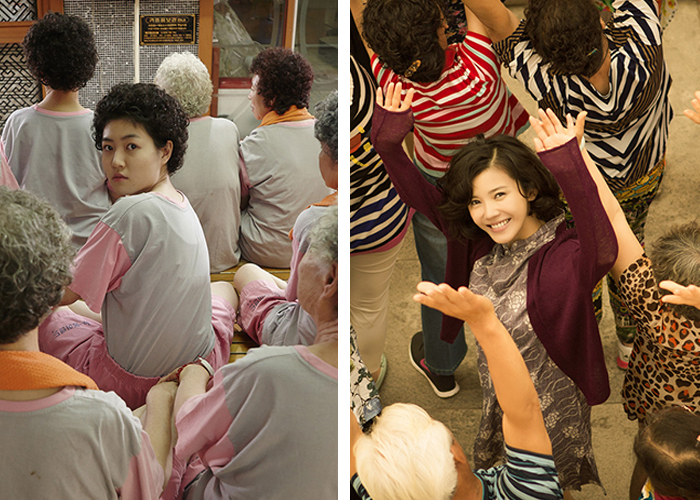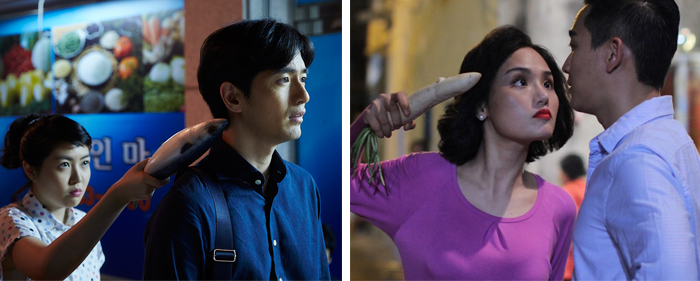
A Chinese remake (right) of the Korean film 'Miss Granny' opens in theaters in January 2015, becoming the biggest commercial hit ever for a Korea-China joint production.
"Miss Granny," a Korean comedy about a woman in her 70s who magically regains her youth, is capturing the hearts of audiences across Asia.
The original film, directed by Hwang Dong-hyuk, was released in theaters in 2014 to become a domestic box office hit, selling 8.65 million tickets in Korea. Last year, remakes of the movie were released in China and Vietnam to much acclaim. Remakes of the film are also due to open this year in Japan, Thailand and Indonesia.

In the original film, the main character realizes that she regained her youth when she visits a public sauna. In the Chinese version, she makes the realization while dancing in a public square.
The first remake of "Miss Granny" was co-produced by companies in Korea and China. The film was released in January 2015 with the title "20 Once Again" (重返20岁) and was directed by Leste Chen (陳正道). It became a massive box office hit, grossing CNY 3.65 billion, or around KRW 64 billion. In the film, actress Gua Ah Lei (归亚蕾) plays the 70 year old "granny," and rising star Yang Zishan (楊子珊) plays the woman's younger self.
The Chinese remake kept the lightness of the original's fantasy-comedy genre, but added more romantic elements to the film to cater to the tastes of local audiences. It also modified the setting in certain parts of the plot to make the scene more relatable to Chinese movie-goers. For example, in the original film, the main character realizes that she has regained her youth while at a public sauna. The Chinese character discovers this when dancing with the elderly in a public square. The soundtrack for the remake was also localized, and includes songs by Deng Lijun (鄧麗君), an artist from the 1970s and 1980s who rose to fame across China, Korea and Japan. These familiar songs, combined with great acting and an engaging storyline, helped to make the remake a commercial success in the Chinese market.

The lead actress interrogates her romantic interest in the original 'Miss Granny' with a fish (left). In the Vietnamese version, the actress encounters her male co-star holding a radish.
Following the huge success of the Chinese remake, Vietnam released "Sweet 20" (Em la ba noi cua anh), directed by Phan Gia Nhat Linh, toward the end of 2015. Rather than emphasizing the romance between characters as had the Chinese remake, the Vietnamese version focused instead on familial love, using a grandmother-grandson relationship to illustrate the strength of love between family members. It also added comedic, slapstick elements to the film by casting Vietnamese comedians in supporting roles. With this formula, the film has now become the highest grossing locally-produced Vietnamese film of all time.

'Miss Granny' is remade in 2015 for the Vietnamese market as 'Sweet 20' (left), and there's even an upcoming Japanese version, too (right).
The newest installment in the "Miss Granny" franchise is due to be released in Japan on April 1. With the same title as the original, the film is directed by Mizuta Nobuo (水田伸生). The biggest change in the Japanese version is that the central conflict arises not from an interaction between the grandma and her daughter-in-law, but from discord between the main character, who is a single mother, and her own daughter. In this remake, the younger version of grandma is played by Tabe Mikako (多部未華子), known for her role in the 2015 Japanese movie "Midnight Diner." Her older self will be played by renowned actress Baisho Mitsuko (倍賞美津子).
As a comedy that touches on social issues related to the elderly, with familial love as the takeaway message, "Miss Granny" has been able to touch the hearts of audiences across Korea, China and Vietnam, and it will soon reach audiences in Japan, Thailand and Indonesia.
By Lee Hana
Korea.net Staff Writer
Photos: CJ E&M
hlee10@korea.kr